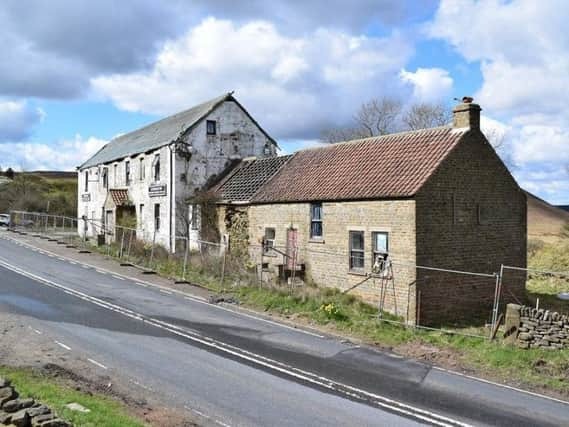Plans approved to demolish the landmark Saltersgate Inn


For over a decade the famous inn, once a smugglers' haunt, on the Pickering to Whitby road, has been seen as the worst eyesore in the park, after being the victim of a bankruptcy and the financial crash in 2008.
Now, the site will be pulled down and a single storey café and tap room built in its place.
Advertisement
Hide AdAdvertisement
Hide AdThe inn, sited at a spot known locally as The Devil's Elbow, a steep winding hill, near the Hole of Horcum, is famous for its rich history in smuggling. It was renown for its peat fire which had burned continuously for over 200 years until the pub closed.
Senior planning officer at the National Park, Hilary Saunders, said in a report to members of its planning committee: "The inn has been left to fall into an extremely poor state of repair by the previous owner."
Once a top eating house in North Yorkshire, she says: "Officers have been working very closely with the new owners to find an acceptable way forward for either renovation of the existing building or redevelopment of the site."
Expert architects and landscape architects from the Design Council were brought in to study the site and its potential. They said the inn is located on the largest expanse of heather moorland in England and Wales and the unique landscape should be the driving force behind the design of the new build.
Advertisement
Hide AdAdvertisement
Hide AdThe new inn will have a café and restaurant to seat 60, together with a new brewery and tap room. "It will provide a family friendly environment for casual diners, walkers and a convenient meeting place, say Havernbeck."
The company added: "The use of banked heather planting will continue the colours and texture of the moorland landscape."
Mrs Saunders said that a million vehicles travel the moorland road past the Saltersgate Inn each year. The new development will be a significant visual improvement to the landscape due to the removal of a long-standing "eyesore" in the park.
According to folklore, the inn was used by smugglers bringing salt into the country from the coast near Robin Hood's Bay and across the moors, to avoid paying the salt tax.
Advertisement
Hide AdAdvertisement
Hide AdOriginally known as The Waggon and Horses Inn, fishermen and smugglers used the isolated inn to carry on their trade of illegally salting fish which kept the catches fresh.
Legend has it that the smugglers traipsed across the moors at night when they were unlikely to be detected. Drama resulted when a lone excise officer infiltrated the smugglers and caught them and fishermen red-handed, resulting in a fight in which the excise officer was killed.
To conceal the murder it is said that the officer was buried underneath the fireplace and the fire above him burned for 200 years and it was claimed that if the fire was ever extinguished his ghost would come back and seek revenge for his death.